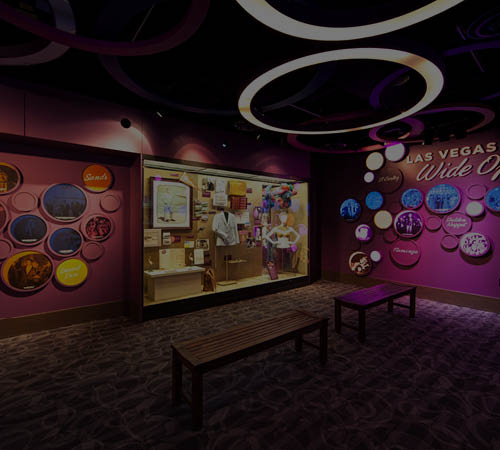NEVADA’S 2014 MICHAEL LANDSBERRY TEACHER OF THE YEAR AWARD WINNER
The Mob Museum honors Jeff Hinton
Nevada’s 2014 Michael Landsberry Teacher of the Year award winner
When or how did you develop a love of history?
My love of history actually didn’t take place until I was in my early 20s. Like most young people, I thought history was boring in school – names, dates and places – blah, blah blah. When I joined the Marine Corps, that began to change. Marines pride themselves in their traditions and history, and while a Marine, I had the opportunity to visit places that have historical significance such as Okinawa. It was at this time that I began to realize that history is about real people who lived real experiences. History is a story well told, and I love a good story.
What is your background and personal history?
I was born in Oregon, but grew up in Connecticut. I moved with my family to southern Nevada in the late 1980s. In 1990 I joined the U.S. Marine Corps and received an honorable discharge in 1994. After my stint in the Marines I moved back to southern Nevada and began college. I graduated from UNLV with master’s degrees in both curriculum and instruction and American history. I have been married more than 12 years and have three beautiful daughters. I have been a teacher in the Clark County School District for 12 years, and I have taught at the Northwest Career and Technical Academy for the last seven years. In addition, I am also an adjunct instructor at the Nevada State College.
How have you used The Mob Museum in the past to teach history to your students?
In the past I have used The Mob Museum to teach history by focusing on the Museum’s exhibits that directly pertain to Clark County curriculum standards such as immigration, prohibition and the Kennedy administration.
Describe your special relationship with the Museum and ways you have helped the Museum in the past.
A while back, I attended a conference presented by the Nevada Council for History Education at the Museum and fell in love with it. The Museum is such a significant cultural institution that I knew I wanted to be involved in some way. Later, as I was perusing the Museum’s website, I saw that there were volunteer opportunities and contacted the Museum. As a volunteer, I most recently helped to plan and implement a school field trip to the Museum in celebration of Kefauver Day on Nov. 15. (Kefauver Day is held each year at the Museum to raise awareness of the significance of the U.S. Senate Special Committee to Investigate Organized Crime in Interstate Commerce, as the Kefauver Committee hearings were officially called, on the nation’s fight against organized crime as well as the development of Las Vegas as the gaming capital of the nation.)
In addition, I have written lesson plans for the Museum on such subjects as immigration, life in the tenements and, of course, the Kefauver hearings. I have also consulted with the Museum in trying to get more students to the Museum.
What have been the reactions of your students to learning at The Mob Museum?
Of the several field trips I have chaperoned to the Museum I have not had a disappointed customer yet.
Why is The Mob Museum important to presenting history in Las Vegas?
Unfortunately, many people erroneously believe that Las Vegas is devoid of history. This couldn’t be further from the truth. Las Vegas history may not be as noted as say New York’s or Chicago’s, but it is a fascinating and rich history nonetheless. Of course it doesn’t help that we tear down our buildings when they get old and dated. The Mob Museum is an important conduit for preserving the past and I love it when students tell me that they learned something new about Las Vegas that they had not known before.
What makes a place like The Mob Museum relevant to history and teaching?
The Museum is relevant to my teaching because I believe that learning history is best done when you involve the student. Classroom lectures have their place, but when students have the opportunity to see, hear and experience the history, the students get hooked, and hopefully develop within them a lifelong joy of learning.
Does The Mob Museum help you better interact with some of those hard-to-reach students? If so, how?
All students have likes and dislikes, some like history and others don’t. The Museum is an excellent way for students to make connections to the past. History is essentially a story and everybody loves a story well told. I think The Mob Museum does an excellent job telling the history of organized crime and law enforcement.
What would you like to see happen in the future with Las Vegas students and The Mob Museum?
I would like to see all high school students have the opportunity to visit The Mob Museum at least once while in senior high. Considering the number of high schools and students we have in the CCSD the Museum would be very busy, but I believe that it would be worth it. Anybody who has been to The Mob Museum can no longer claim that history is boring!





